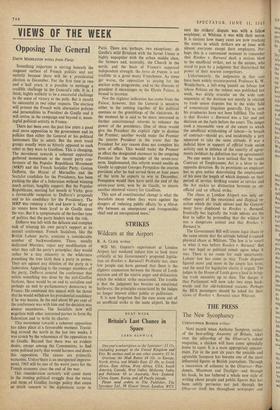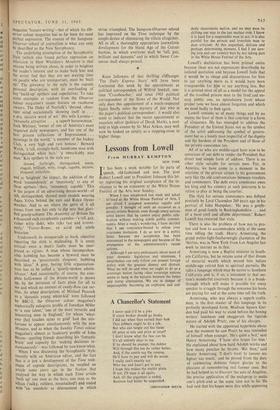CHRISTOPHER BOOKER writes: Next month when Anthony Sampson, author of
the best-selling Anatomy of Britain, takes over the editorship of the Observer's colour magazine, a chicken will have come splendidly home to roost. It is a most appropriate appoint- ment. For in the past six years the amiable and agreeable Sampson has become one of the most influential figures in British journalism. Through a succession of columns in the Observer--Pen- dennis, Mammon and Daylight—and through his book, he has fathered a whole new style of writing about people and public figures that has been subtly pervasive not just through the Observer itself but throughout newspaper and magazine 'feature-writing'—but of which the Ob- server colour magazine has so far been the most Perfect expression. The essence of the Sampson- Observer school of journalism is what can only be described as the New Sycophancy.
The underlying assumption of the Sycophantic Style (which also found perfect expression on television in Huw Wheldon's Monitor) is that anyone being written about, in order to heighten the reader's interest and to make both him and the writer feel that they are not wasting time on people who are unimportant, must be 'built Up.' The giveaway to the style is the capsule Personal description, with its overloading of key 'build-up' epithets and superlatives To take sune examples at random from the Observer colour magazine's recent feature on racehorse owners. The Duke of Norfolk's 'shrewd, obser- vant mind occasionally showing itself in . . . a dry, incisive word of wit.' His wife Lavinia— 'extremely attractive . . . a superb horsewoman.' Jock Whitney, 'owner of one of America's most respected daily newspapers, and has one of the best private collections of Impressionist . . . Paintings in the world,' a member of the Jockey Club, a very high and rare. honour.' Bernard Walsh, 'a tall, strongly-built, handsome man with distinguished white hair,' a remarkably nice Man.' Key epithets in the style are:
shrewd, forthright, distinguished, suave, elegant, brilliant, witty, tough, capable, incisive, eloquent, articulate.
and to 'heighten' the impact, the addition of the Word 'tremendously' or 'immensely' to any of these epithetsl'–thus, 'immensely capable.' This IS the jargon of an advertising dream-world—of tall, distinguished, shrewd male models wearing Aqua Velva behind the ears and Rolex Oyster Watches. And to see where the spirit of it all Comes from one has only to dip into that glori- fied gossip-column The Anatomy of Britain for a thousand such sycophantic capsules—`a tall, gay, rather witty duke, who talks fast and irrever- ently,"Trevor-Roper, an acrid and subtle historian.'
Underneath its masquerade as hard, objective reporting the style is misleading. It is never critical—even a man's faults must "be inter- preted as vistues. A man whose incomprehen- sible babbling has become a byword must be described as 'passionately eloquent, bubbling With ideas.' A grey, boring little organisation- Man has to be called a 'quietly-spoken admin- istrator.' And occasionally, of course, the com- plete hollowness of the dream-world is shown UP, by the intrusion of facts plain for all to see and which no amount of candy-floss can sur- vive. As when descriptions of Michael Peacock as a 'dynamic young whizz-kid' were followed by BBC-2, the Observer colour magazine's euphorically eulogistic profile of Jonathan Miller as 'a vast talent,' one of the most versatile and Interesting men in England,' for whom 'what- ever [he] touches turns to gold' had the mis- fortune to appear simultaneously with the new Monitor, and as when the Sunday Times colour Magazine's almost as laudatory profile of John Bloom—quoting friends describing his 'fantastic brain' and capacity for 'making decisions in- stantaneously'—was followed by you-know-what. When I was discussing the Sycophantic Style recently with an American editor, and the fact that it is just a development of the Time tech- lique of capsule descriptions, he recalled an article some years ago in the Nation that analysed the way in which each Time article built up' one man as the hero, one man as the Villain ('sulky, ruthless, moustached') and ended With "an anecdote as denouement in which virtue triumphed. The Sampson-Observer school has improved on the Time technique by the simple device of eliminating the villain altogether. All in all, a thoroughly appropriate journalistic development for the bland Age of the Colour Section, in which everyone shall be 'tall, gay, brilliant and dynamic' and in which Sweet Con- sensus shall always prevail.
Keen followers of that thrilling cliffhanger 'The Daily Express Story' will have been fascinated this week by the appointment as political correspondent of Wilfrid Sendall, one- time *Crossbencher,' and since 1963 political correspondent of the News of the World. Not only does this appointment of a much-respected figure finally solve the mystery of just who is the paper's political correspondent : it would also seem to indicate that the recent appointment as associate editor (politics) of Derek Marks, a man held in high esteem by Sir Max Aitken, may well now be looked on simply as a stepping-stone to higher things.



































 Previous page
Previous page